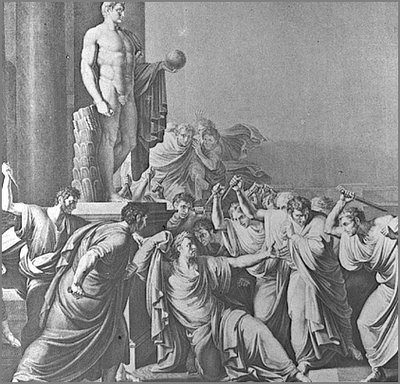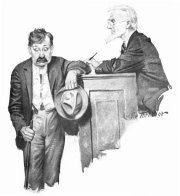Quote of the Day - Nov 29/05
Harlan Ames - Gleanings 5.174
agonizomai (Greek): to strive, fight, labour fervently
“Strive to enter through the narrow door. For many, I tell you, will seek to enter and will not be able..."
Luke 13:24
 God has always given to His people the gift of prophets, through whom the Holy Spirit spoke eternal and unalterable truth concerning the Christ, and things touching Him and His people. But God always permitted false prophets to arise so that His people might be tested. Regrettably, the track history of both kingdoms in Israel was that they were led astray by them. Today, it is no different - in fact it is worse. And not only is it worse, but it will get a lot worse than it is even now. They will deceive millions and, if it were possible, even the elect will be led astray.
God has always given to His people the gift of prophets, through whom the Holy Spirit spoke eternal and unalterable truth concerning the Christ, and things touching Him and His people. But God always permitted false prophets to arise so that His people might be tested. Regrettably, the track history of both kingdoms in Israel was that they were led astray by them. Today, it is no different - in fact it is worse. And not only is it worse, but it will get a lot worse than it is even now. They will deceive millions and, if it were possible, even the elect will be led astray.
 The more I press on in the Christian walk the more I am convicted about the matter of pride. I begin to see its ugliness and its pervasiveness in my being. It is a monster that crowds out the presence of the God of all humility. How can I possibly expect to recognize such a quiet, meek and lowly God through the screaming arrogance of my own restless heart?
The more I press on in the Christian walk the more I am convicted about the matter of pride. I begin to see its ugliness and its pervasiveness in my being. It is a monster that crowds out the presence of the God of all humility. How can I possibly expect to recognize such a quiet, meek and lowly God through the screaming arrogance of my own restless heart?
 Before jumping into chapter 2 of 2Peter I want to post a series of three pieces that are all interrelated. They deal with the common Christian problem of balance.
Before jumping into chapter 2 of 2Peter I want to post a series of three pieces that are all interrelated. They deal with the common Christian problem of balance.
The relationship between these extremes is not a straight line, but as the base of a triangle, the apex of which is the gospel. The right direction to steer in whenever we detect ourselves astray is never to go the opposite direction, but towards the gospel. It is the corrective for both conditions.
1) How to Be a Perfect Christian Without Mr. LegalismEnjoy. I hope they cut you to the heart, let in some light and bless you greatly. I certainly need the truths contained in them to reach deep into my own soul - and I pray that I will be laid low by revisiting them.
2) How to Be a Perfect Christian Without Mr. Libertinism
3) Et Tu Brute (touching on the abuse of grace by the Christian)


 Adam, as the federal head of all humanity (even though they were as yet unborn), served God under the covenant of works. If He obeyed God explicitly in all points at all times down to the most exquisite of details, then God would remain his sovereign companion and provider. Adam willfully failed to keep his end of the agreement and, as a result, we live in a world of darkness and sin. All of Adam’s children are born in darkness - already lost and already dead in trespasses and sins because, outside of obedient fellowship with God, only sin is possible. As God Himself put it in describing people even before the flood, "Every imagination of the thoughts of men’s hearts was only evil continually."
Adam, as the federal head of all humanity (even though they were as yet unborn), served God under the covenant of works. If He obeyed God explicitly in all points at all times down to the most exquisite of details, then God would remain his sovereign companion and provider. Adam willfully failed to keep his end of the agreement and, as a result, we live in a world of darkness and sin. All of Adam’s children are born in darkness - already lost and already dead in trespasses and sins because, outside of obedient fellowship with God, only sin is possible. As God Himself put it in describing people even before the flood, "Every imagination of the thoughts of men’s hearts was only evil continually." Jesus Christ is the only other man with whom God ever made a covenant. It was a new covenant – the covenant of grace – the new covenant in His blood. The only man that would ever keep the original covenant was the God/man Jesus Christ. God swore by Himself, since there was nothing greater by which He could swear, that He would redeem His people. God covenanted with Himself in the person of Christ, since there was no other who could live by the terms of the agreement. The new covenant extended to - it covered - all of those who were latently in Christ, who would later be revealed, who would spring from His spiritual loins, who were contained (through God’s election) in the mystery of His redemption.
Jesus Christ is the only other man with whom God ever made a covenant. It was a new covenant – the covenant of grace – the new covenant in His blood. The only man that would ever keep the original covenant was the God/man Jesus Christ. God swore by Himself, since there was nothing greater by which He could swear, that He would redeem His people. God covenanted with Himself in the person of Christ, since there was no other who could live by the terms of the agreement. The new covenant extended to - it covered - all of those who were latently in Christ, who would later be revealed, who would spring from His spiritual loins, who were contained (through God’s election) in the mystery of His redemption.

Part 1 can be heard by clicking this link.
Part 2 can be heard by clicking this link.
Part 1 can be heard by clicking this link.
Part 2 can be heard by clicking this link.
 This is the sort of thing that distinguishes Christianity from most of the other religions of the world. It is historical. It is based in observed, witnessed, falsifiable data that has never been able to be falsified. In this regard, it is more scientific than the theory of evolution.
This is the sort of thing that distinguishes Christianity from most of the other religions of the world. It is historical. It is based in observed, witnessed, falsifiable data that has never been able to be falsified. In this regard, it is more scientific than the theory of evolution.
 Not only is Peter happy to keep on pounding into the saints the truths of the gospel, but he has gone to pains to see that the importance of these things is written down so that, even after he is dead, he will be harping on them from the very grave. In the face of this, how can we blow off a study time with the Lord and think nothing of it?
Not only is Peter happy to keep on pounding into the saints the truths of the gospel, but he has gone to pains to see that the importance of these things is written down so that, even after he is dead, he will be harping on them from the very grave. In the face of this, how can we blow off a study time with the Lord and think nothing of it? There is no other way to be sanctified than by the Spirit, through the Word (the Son), unto the Father - just as the proper way to pray is unto the Father, through the Son, by the Spirit. Would you know the Father? You must come through the Word by the Spirit. Christ is known through revelation of God and God’s revelation is in the Bible - all of it. Not some of it - all of it. And the revelation of Christ is the ministry of the Holy Spirit. It’s useless to be praying for a closer fellowship with the Lord so long as you have the written Word in your hands, but will not read it. The Holy Spirit may not reveal Christ in the Word to you as and when you would want, but He will not reveal Christ at all unless there is a thirst in you to know Him through the means already provided and ordained.
There is no other way to be sanctified than by the Spirit, through the Word (the Son), unto the Father - just as the proper way to pray is unto the Father, through the Son, by the Spirit. Would you know the Father? You must come through the Word by the Spirit. Christ is known through revelation of God and God’s revelation is in the Bible - all of it. Not some of it - all of it. And the revelation of Christ is the ministry of the Holy Spirit. It’s useless to be praying for a closer fellowship with the Lord so long as you have the written Word in your hands, but will not read it. The Holy Spirit may not reveal Christ in the Word to you as and when you would want, but He will not reveal Christ at all unless there is a thirst in you to know Him through the means already provided and ordained.
 Three more posts and 2Peter Chapter 1 is done. However, the following post offers a short break. Sometimes it is good to change the focus for a moment - to get up from the desk and step out onto the verandah, so to speak. I always make sure, for example, to alternate my studies between Old and New Testaments. I will even break off from a long book to study a shorter one in the other Testament - before coming back to finish my original study.
Three more posts and 2Peter Chapter 1 is done. However, the following post offers a short break. Sometimes it is good to change the focus for a moment - to get up from the desk and step out onto the verandah, so to speak. I always make sure, for example, to alternate my studies between Old and New Testaments. I will even break off from a long book to study a shorter one in the other Testament - before coming back to finish my original study.
 The life of regret is a terrible thing and plentiful are those who have pierced themselves with many sorrows. But the ultimate sorrow is to have lived a godless life unto the self, to have drunk greedily and without acknowledgment from all God’s goodness in the easy times, when we seemed immortal, and we felt ourselves capable of anything. But God is not mocked - for whatever a man sows he will reap.
The life of regret is a terrible thing and plentiful are those who have pierced themselves with many sorrows. But the ultimate sorrow is to have lived a godless life unto the self, to have drunk greedily and without acknowledgment from all God’s goodness in the easy times, when we seemed immortal, and we felt ourselves capable of anything. But God is not mocked - for whatever a man sows he will reap.
 Peter is not ashamed to harp on the important things of doctrine. Here, he says that he intends always to remind the saints, regardless of how mature or learned they are - or think they are. He knows Israel’s history. He was right to be careful, for Israel’s history parallels that of the church. Israel knew God’s law. Israel had the covenants. Israel had Moses and the prophets. Yet Israel needed to be told over and over again.
Peter is not ashamed to harp on the important things of doctrine. Here, he says that he intends always to remind the saints, regardless of how mature or learned they are - or think they are. He knows Israel’s history. He was right to be careful, for Israel’s history parallels that of the church. Israel knew God’s law. Israel had the covenants. Israel had Moses and the prophets. Yet Israel needed to be told over and over again.
 The Greek word spoudazo translated "be diligent" has connotations of labour, study and exertion. It is a conscious pressing upon God for the very things talked of in the last few verses. It is a pressing into God for them. It is a laying hold of what God has given us in Christ. It is not making ourselves Christ-like.
The Greek word spoudazo translated "be diligent" has connotations of labour, study and exertion. It is a conscious pressing upon God for the very things talked of in the last few verses. It is a pressing into God for them. It is a laying hold of what God has given us in Christ. It is not making ourselves Christ-like.
 Things previously listed in the last 2 verses. If these are yours and abound or are increasing... We were exhorted to add these things to our faith. It all started with the belief in Christ that we have been given by God. With this gift of faith we were made partakers in the divine nature and given the means by which to grow in grace.
Things previously listed in the last 2 verses. If these are yours and abound or are increasing... We were exhorted to add these things to our faith. It all started with the belief in Christ that we have been given by God. With this gift of faith we were made partakers in the divine nature and given the means by which to grow in grace.
1) They ought not to evoke in us the thought that the Bible teaches that there are two types of Christian - the carnal and the spiritual. There are not. There are Christians and non-Christians and that is all. And each person, as we shall see in the next verse, is responsible for knowing which he or she is.The question of such a person having been forgiven for his "old" sins is neither a proof that true salvation can be lost, nor that a person can be a "sleeper" Christian - one barely in through the door but who then lives as he pleases, without losing his salvation. There is too much scriptural evidence elsewhere supporting the eternal security of the believer. And there is no shortage of teaching that for a professor of Christ to continue in willful and unrepented sin is actually evidence of a false profession.
2) They ought not to generate in us a sense of complacency about the state of our brethren. We have a duty to warn them. When we see a brother failing it is a loving thing to do to exhort or rebuke or reprove or admonish Him - in a spirit of gentleness, when we can. {Galatians 6:1}


Some translations have us adding brotherly affection "and" love, or "leading to" love - but both the AV and the NIV regard these as two separate additions. "Add to godliness brotherly kindness, and to brotherly kindness add love."
"Philadelphia" is the Greek word for brotherly kindness or affection. It is related to the world phileo - a word used for the sort of love that is moved by something in another person. Our phileo love is love that finds its motivator in something lovely in its object. It is love that responds emotionally to an attribute or characteristic of another. I love my friend because there are things in him that I find lovable. I looked upon him/her and I was moved, attracted or drawn by something in them. That is phileo. It is distinguished here, and throughout the Bible, from the word translated as love in verse 7, which is agape. Agape love does not need to find anything in its source that moves it to love. Agape loves as an act of the will. Phileo love, for instance, will often characterize the beginning of a marriage relationship. But for the relationship to endure there must also be agape. There will be times when a spouse seems most unlovable, and it is then that the will to love must be found. And when it is, then it is the beginning of true godly love.
It is distinguished here, and throughout the Bible, from the word translated as love in verse 7, which is agape. Agape love does not need to find anything in its source that moves it to love. Agape loves as an act of the will. Phileo love, for instance, will often characterize the beginning of a marriage relationship. But for the relationship to endure there must also be agape. There will be times when a spouse seems most unlovable, and it is then that the will to love must be found. And when it is, then it is the beginning of true godly love.
In the normal order, because God has ordained that we must grow in grace, the lesser thing necessarily comes before the greater. We learn to express brotherly love first because we are not ready to express the more complete form of love. God weans us from milk to meat. He allows us to love our brothers based on emotional preferences - personal likes and dislikes. In this we can go quite deep but we will not attain to the exhibition of agape. We can be civil, considerate and tolerant within the realm of brotherly affection. We can have sacrificial love within its bounds. We can die for a brother or sister. But the Apostle Paul put it best when he said...
For scarcely for a righteous man will one die: yet peradventure for a good man some would even dare to die. But God commendeth his love toward us, in that, while we were yet sinners, Christ died for us. {Romans 5:7-8}
The love of Christ for His people is agape love. It is love that finds no beauty or redeeming quality in its object, but that is an expression of the will. It is the expression of a will belonging to the Eternal and Almighty God Who is, Himself, love. God’s love, then, finds its impetus not in men, but in Himself - and is an expression of His nature through His will. This sort of love loves the unlovely. It loves the enemy. It loves those that behave evilly towards us, and who speak ill of us. It does not need to find loveliness in the one being loved because agape love is expressed in a decision to love the utterly undeserving. Nothing recommends the object of agape love to the one loving. This divine attribute was shown towards us, His people, and it is an attribute that God will display through us as we yield to Him, and as we grow in grace and in the knowledge of our Lord and Saviour, Jesus Christ.
This sort of love loves the unlovely. It loves the enemy. It loves those that behave evilly towards us, and who speak ill of us. It does not need to find loveliness in the one being loved because agape love is expressed in a decision to love the utterly undeserving. Nothing recommends the object of agape love to the one loving. This divine attribute was shown towards us, His people, and it is an attribute that God will display through us as we yield to Him, and as we grow in grace and in the knowledge of our Lord and Saviour, Jesus Christ.
Agape love is the last item on the list for a reason. That reason is that, for many of us, the sort of love described comes after a great rolling road along which we have been led and during which we have been traineded to put to death much of that self-centred and inward looking affection that would chafe at the idea of loving the undeserving. We can speak lofty words about love, but to actually abide in such a love, and to evidence it, we must be emptied as Christ was emptied. This is true experiential religion. It is growth in grace. It is graduating from breast to bottle, to pap, to meat. We want to get there now. God so often seems to have ordained that, though we strive as we must, we shall get there in His time. We must oft-times take the scenic route.
A Whirling Dervish Actually Whirling
That was said with all the naivté of a non-techie ignoramus. Nothing is simple in the unseen world of zeroes and ones that whirl around like light-speed Dervishes to produce the neat little boxes on our screens. I found this out when I Googled the problem, hoping to horn in on the collective wisdom of those who had gone before me - sorta like reading all those Christian authors from bygone ages in order to benefit from their collective wisdom, and to avoid reinventing the wheel (or the entire faith).
Well, the best I could come up with was some guy advising a re-load of Outlook Express after backing up the files (mbx, idx, wab etc.) I thought about that - for a New York minute - and realized that my own copy of Outlook Express had been installed from ISP's software about half a century ago - and had been updated from time to time via the Windows Update facility. I could have copied the necessary e-mail files to a folder on, say, the desktop easily enough - but I had a gazillion Microsoft IE patches installed that my old software would probably take one look at and go shrieking into the ether, complaining about how things are not the same as they used to be; kinda like all those people in the church who hold to tradition as a means of denying change. (You see how you can't win whichever way you go!)
 Theseus Slaying the Minotaur
Theseus Slaying the MinotaurSo I broke down and went to the Microsoft website expecting that a solution was just a keystroke away. Fat chance! Four times I got absolutely lost in the Minotaur's maze that they call a download section. Four times I fought my way out (Theseus eat your heart out!) - but without the information I needed. I circled the site like a wolf looking for a weakness - an opening - that would give me the chance to dart in and pounce on the paltry packet of data that I needed. It was them against me - a primal dance of predator and prey. At last I found something that looked like it might do the job - a modest and disarming little creature called "ie6setupOe.exe" which I was assured would enable me to reload Outlook Express and - away to the races...! I walked right over the seemingly inoccuous notice that advised me that this file was packaged together with an Internet Explorer update. My bad!
Breathless with anticipation, I downloaded that baby, made a copy of my critical data files, closed all my other programs and hit the launch button. At which point another tongue was stuck out and a glib message appeared saying "Installation cancelled because a newer version of Internet Explorer has already been installed." Grrrr... Now, unlike my Agonizomai account at Hotmail, my regular e-mail account does receive more than one item a month. I depend upon it for communication with friends, family and to receive a number of newsletters that interest me. I don't like to be without it. So I wanted a fix - desperately.
For a moment I thought about asking my friend, Peter, to help me sort it all out - but then I had my own moment of madness and downloaded another mail program that promised to be every bit as good as Outlook Express and then some. With a heavy dose of the faithless thought "Yeah, that's what they all say!" running through my head I did it anyway. I downloaded the "Mozilla Thunderbird" e-mail client - more out of desperation than conviction (because, like the people I criticized obliquely above, I hate change myself).
Normally, I am one of those people that can take a small problem like the one described here and, by applying all my intelligence and creativity, make it 10 times worse than it was to start with. Let's say I am sometimes the Stan Laurel of solutions. So, when I installed this "Thunderbird" thing I was almost expecting a complete computer meltdown. But - O, happy day! It not only installed itself flawlessly but also gathered together all my necessary Outlook Express data files and settings, making a seamless transition from one application to the other. There wasn't even the hint of a problem. In fact, I was, perversely, a bit insulted that after initial startup the installation program didn't see fit to ask me a single question. It didn't need me at all. (Which reminds me of another doctrine of Scripture - but I won't go into that right now).
Thunderbird has the look and feel of my old mail program but with a number of advantages, such as its ability to handle RSS feeds from news sources and from other blogs. I like it already. And already, I don't care if the mavens at Microsoft have a hidden "fix"that will get my M-SOE working. In fact, I'm beginning to wonder if Mozilla Firefox might just not be a better bet than MSIE 6. Who knows, I might get to actually like change? - Nah! But there's always hope...
 Self-control by itself is not enough. We may all exhibit a degree of self-control in one area or another, or for a period of time - but we must be sure that this is not mere human effort. By human effort we can cork up anger and feel very self-righteous about it. We can suppress sins of the mind and body like addictive smoking, pornography, excessive drinking. We can squelch the lust of the mind, the unbridled tongue, the jealous thought, the hateful hope. But if it is we who are doing it then the top will blow off sooner or later. Like the man who quit smoking for years and upon lighting a single cigarette went right back to the habit, only now smoked 2 packs a day instead of one.
Self-control by itself is not enough. We may all exhibit a degree of self-control in one area or another, or for a period of time - but we must be sure that this is not mere human effort. By human effort we can cork up anger and feel very self-righteous about it. We can suppress sins of the mind and body like addictive smoking, pornography, excessive drinking. We can squelch the lust of the mind, the unbridled tongue, the jealous thought, the hateful hope. But if it is we who are doing it then the top will blow off sooner or later. Like the man who quit smoking for years and upon lighting a single cigarette went right back to the habit, only now smoked 2 packs a day instead of one. Piety, holiness, reverent respect. These are the meanings of the Greek word eusebeia. Reverent respect for God, for God’s people (on account of God) and for God’s creatures comes upon the understanding that steadfastness brings. When we know that it is God that is making us to stand through faith - when we see that it is His power that we abide in - when we begin to abandon all hope and faith in ourselves, in the old carnal nature and in all other men - then we start to enter into true creaturehood in the hands of omnipotent God, and we begin to find that reverent fear which is the beginning of wisdom.
Piety, holiness, reverent respect. These are the meanings of the Greek word eusebeia. Reverent respect for God, for God’s people (on account of God) and for God’s creatures comes upon the understanding that steadfastness brings. When we know that it is God that is making us to stand through faith - when we see that it is His power that we abide in - when we begin to abandon all hope and faith in ourselves, in the old carnal nature and in all other men - then we start to enter into true creaturehood in the hands of omnipotent God, and we begin to find that reverent fear which is the beginning of wisdom.